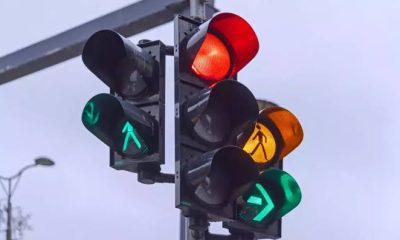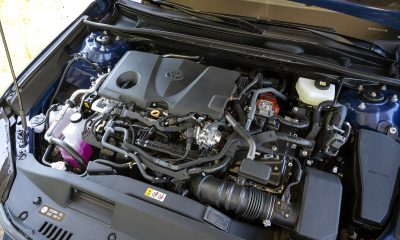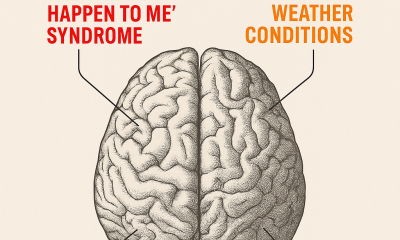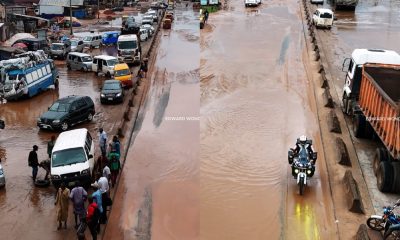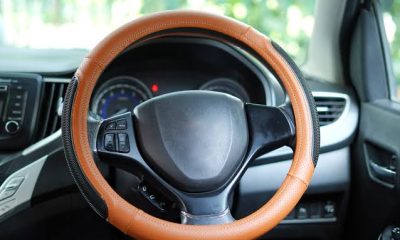News Update
Top 10 Traffic Offenses in Nigeria and Their Penalties

Nigeria has one of the busiest road networks in Africa, with millions of vehicles in daily circulation. From commercial buses and private cars to motorcycles and heavy-duty trucks, our roads bear the weight of constant human and economic movement.
Also Read: Nigerians to pay higher for number plates and driver’s license- FG
Unfortunately, the sheer volume of traffic is matched by a high rate of violations of road traffic laws. These infractions are a leading cause of accidents, injuries, and loss of lives across the country.
The Federal Road Safety Corps (FRSC), Vehicle Inspection Officers (VIO), and the Nigerian Police have stepped up enforcement measures, but many motorists remain unaware of the specific traffic offenses and their corresponding penalties. Ignorance, however, is not an excuse in law.
This article provides a comprehensive breakdown of the top 10 traffic offenses in Nigeria, their penalties, and why compliance is non-negotiable. Every motorist whether private, commercial, or industrial must understand these rules to drive safely and legally.
1. Speeding Beyond Limit
- Description: Driving above the designated speed limit, especially on highways.
- Penalty: Fine of ₦5,000, depending on the degree of violation.
- Risk: Overspeeding is the leading cause of road crashes in Nigeria. According to FRSC, speeding contributes to over 40% of fatal accidents annually.
2. Driving Without a Valid Driver’s License
- Description: Operating a vehicle without an original or renewed license.
- Penalty: Fine of ₦10,000 or possible court action.
- Risk: Unlicensed drivers are considered untrained and unfit for road use, increasing accident risk.
3. Use of Phone While Driving
- Description: Making or receiving calls, texting, or using mobile devices while driving.
- Penalty: Fine of ₦4,000.
- Risk: Diverts attention, slows reaction time, and causes avoidable accidents.
4. Driving Without Seatbelt
- Description: Failure to wear a seatbelt while driving or for passengers in front seats.
- Penalty: ₦2,000 fine per occupant not belted.
- Risk: Seatbelts reduce the risk of death in crashes by up to 45%.
5. Driving Under the Influence (DUI)
- Description: Driving after consuming alcohol or drugs that impair judgment.
- Penalty: Fine of ₦5,000 or referral to court.
- Risk: Alcohol reduces reaction speed and increases reckless decisions, causing head-on and fatal collisions.
6. Overloading
- Description: Carrying passengers or goods beyond the manufacturer’s limit.
- Penalty: ₦5,000 fine or offloading order by FRSC.
- Risk: Overloaded vehicles strain brakes, tires, and suspension, leading to accidents and fatalities.
7. Use of Expired or Fake Documents
- Description: Driving with expired or counterfeit licenses, insurance, or roadworthiness certificates.
- Penalty: Varies from ₦3,000 to ₦10,000 depending on the document. Fake documents may lead to arrest and prosecution.
- Risk: Invalid insurance leaves victims unprotected in accidents; fake papers enable stolen cars to circulate.
8. Dangerous Overtaking
- Description: Overtaking in sharp bends, junctions, or without proper visibility.
- Penalty: ₦5,000 fine.
- Risk: Causes head-on collisions, which are among the deadliest forms of accidents.
9. Failure to Install or Use Caution Signs During Breakdown
- Description: Not placing caution triangles or warning signals when a vehicle breaks down.
- Penalty: Fine of ₦3,000.
- Risk: Causes chain-reaction crashes at night or in low-visibility conditions.
10. Driving Without Insurance
- Description: Operating a vehicle without at least third-party insurance.
- Penalty: ₦10,000 fine and possible impoundment.
- Risk: Accident victims receive no compensation; financial losses are fully borne by the motorist.
Beyond the Top 10: Other Offenses Motorists Often Forget
- Driving against traffic (“one-way”) – penalty: ₦50,000 fine in Lagos.
- Driving with worn-out tires – penalty: ₦3,000 fine.
- Failure to renew vehicle license – penalty: ₦3,000 (private) or ₦5,000 (commercial).
- Obstruction of traffic (illegal parking) – penalty: ₦5,000 fine.
Why These Offenses Matter
Traffic laws are not just about collecting fines, they are lifesaving measures. Every time a driver ignores a seatbelt, overloads passengers, or overspeeds, lives are put at risk. In 2024 alone, Nigeria recorded over 13,000 road crashes and 6,500 deaths according to FRSC data. Most of these were linked to preventable human errors.
How to Stay Compliant as a Nigerian Driver
- Know the Laws: Familiarize yourself with FRSC’s Highway Code and state traffic regulations.
- Renew Documents Promptly: Never wait until expiry before renewal.
- Maintain Vehicle Health: Ensure brakes, lights, and tires are always in good shape.
- Avoid Cutting Corners: Resist fake “agents” promising shortcuts for licenses or insurance.
- Practice Defensive Driving: Anticipate mistakes of other drivers and stay alert.
Conclusion
Driving in Nigeria requires more than just owning a vehicle, it demands responsibility, compliance, and awareness. Traffic laws exist to protect lives, not to punish. By avoiding these top 10 offenses, motorists not only save themselves from fines and impoundments but also contribute to safer roads for everyone.
The message is simple: “Obey the law, save lives including yours.”
News Update
NUPENG Calls Off Strike After DSS-Brokered Resolution with Dangote

Fuel Crisis Watch (RoadKing.ng)
Update Overview
The Nigeria Union of Petroleum and Natural Gas Workers (NUPENG) has officially suspended its nationwide strike, following a decisive agreement with Dangote Refinery facilitated by the Department of State Services (DSS) and high-level government intervention.
Also Read: Fuel Crisis: Filling Stations in Calabar Shut Down
NUPENG’s National President, Williams Akporeha, confirmed that Dangote agreed to allow unionisation of its drivers, one of the union’s central demands.
A Memorandum of Understanding (MoU) was signed, affirming that unionisation is a fundamental right, that the process should begin immediately, and that no worker should face retaliation for joining. The goal is to complete the process between September 9–22, 2025.
Implications & Impact
| Focus Area | Highlights |
|---|---|
| Fuel Supply | The suspension of the strike is expected to avert any looming fuel shortages and restore normal distribution across the country. |
| Industry Relations | The resolution enhances labour relations within the petroleum sector and signals positive steps toward upholding workers’ rights. |
| Next Steps | Stakeholders will monitor the MoU’s implementation closely, with government-led oversight to ensure compliance and prevent future disputes. |
News Update
Fuel Crisis: Filling Stations in Calabar Shut Down

Fuel Crisis Watch (RoadKing.ng)
Reports confirm that all filling stations across Calabar have been shut down, leaving motorists and commuters stranded across the city.
Also Read: Fuel Scarcity Threatens Delta State as IPMAN and NUPENG Launch Indefinite Strike
The closure appears to be the result of an enforced directive, NUPENG operatives are actively overseeing the shutdown, halting both lifting and sale of petroleum products.
The impact is immediate and severe, with commuters forced to walk long distances while public transport becomes scarce and irregular.
Implications
- Transportation Collapse: With no fuel available, vehicles including taxis and buses are grounded, trapping commuters and disrupting daily life.
- Economic Strain: The shutdown is expected to spike black-market activity, potentially leading to exorbitant fuel prices and further hardship.
- Public Health Risk: Emergency services, including ambulances and generators in healthcare centers, face critical fuel shortages unless immediate intervention occurs.
Stakeholder Response
- At this time, there’s no public statement from IPMAN or NUPENG explaining their motives or outlining expectations for a resolution. However, the enforced nature of the closure suggests an institutional or union-driven action.
- There’s no confirmation yet of government intervention or negotiations underway to restore fuel distribution in Calabar.
Summary at a Glance
| Category | Update Highlights |
|---|---|
| Fuel Station Status | All filling stations in Calabar closed by NUPENG enforcement |
| Reason | Suspension of operations, lifting and sales halted |
| Transport Impact | Severe disruption: commuters stranded, vehicles inactive |
| Black-market Risk | Likely surge in illicit fuel distribution at inflated rates |
| Response Status | No official statements or government action yet |
RoadKing.ng Next Steps
- Monitoring: I’ll track developments, like union statements, government intervention, or easing of restrictions and relay them promptly as they emerge.
- Visual Alert: Would you like a branded “Fuel Crisis Watch” alert graphic or PR banner to publish on your site or social media for heightened visibility?
News Update
How to Spot Fake Car Documents in Nigeria

Nigeria’s roads are not just filled with cars, buses, and trucks; they are also rife with fraudulent car documents that put innocent motorists at risk. From fake driver’s licenses and cloned insurance papers to forged proof of ownership and counterfeit roadworthiness certificates, document forgery has become a thriving underground business.
Also Read: Top 10 Traffic Offenses in Nigeria and Their Penalties
Many unsuspecting drivers fall victim to these scams when they patronize unverified agents who promise “faster processing” of licenses or cheaper insurance.
In the end, they are left with worthless papers that land them in trouble with law enforcement, cause loss of insurance claims during accidents, or even implicate them in criminal activities involving stolen vehicles.
This article provides Nigerian motorists with a comprehensive survival guide on spotting fake car documents, understanding their risks, and learning how to verify authenticity through official channels like the FRSC’s National Vehicle Identification System (NVIS) and other regulatory bodies.
Common Fake Car Documents in Nigeria
1. Driver’s License
- How Scammers Operate: Fake agents often collect money for licenses but skip the official FRSC process. Victims receive laminated cards that look real at first glance but cannot be verified on the FRSC database.
- How to Spot Fake:
- Missing hologram seal or poor-quality print.
- Invalid license number that fails verification on nigeriadriverslicence.org.
- Absence of biometrics capture during the process.
2. Vehicle License
- How Scammers Operate: Drivers pay touts at licensing offices who issue counterfeit receipts or reuse expired papers.
- How to Spot Fake:
- Check for mismatched vehicle details (plate number, engine number, or chassis).
- Official vehicle licenses come with barcodes that can be scanned.
- Verify through your state licensing authority.
3. Proof of Ownership Certificate
- How Scammers Operate: Fake certificates are often used to sell stolen vehicles. Buyers, unaware, drive off with incomplete documentation that later gets flagged by the police.
- How to Spot Fake:
- Ensure details on the proof of ownership match those on the vehicle license and insurance.
- Validate at the state licensing office or through FRSC’s NVIS portal.
4. Roadworthiness Certificate
- How Scammers Operate: Some motorists obtain roadworthiness certificates without presenting vehicles for inspection, often through corrupt officers or fake agents.
- How to Spot Fake:
- Genuine certificates come after a vehicle inspection by VIO.
- Certificates carry unique serial numbers traceable to the issuing state.
- If your car was never inspected, your certificate is likely fake.
5. Insurance Certificate
- How Scammers Operate: Fraudsters issue counterfeit third-party insurance papers at ridiculously low prices. Victims think they are insured until an accident occurs.
- How to Spot Fake:
- Verify insurance through NAICOM’s official portal or via SMS verification.
- Authentic insurance certificates show policy numbers traceable to the issuing company.
- Be wary of insurance sold at roadside kiosks.
6. Tint Permit
- How Scammers Operate: Unauthorized agents issue fake police permits for tinted glass, which fail verification at police checkpoints.
- How to Spot Fake:
- Genuine permits are issued by the Nigerian Police Force Headquarters, not roadside officers.
- Confirm permits at NPF ICT department.
Dangers of Using Fake Car Documents
- Legal Penalties – FRSC and police impound vehicles, fine motorists up to ₦20,000, and may prosecute offenders in mobile courts.
- Loss of Insurance Claims – If your documents are fake, insurance companies won’t honor accident claims.
- Criminal Implications – Fake documents linked to stolen cars can implicate innocent buyers in criminal investigations.
- Financial Losses – Motorists lose money to fake agents and later still have to pay for genuine documents.
How to Verify Your Documents
1. Driver’s License
- Verify at nigeriadriverslicence.org.
- Enter your license number to confirm validity.
2. Vehicle License, Proof of Ownership, Roadworthiness Certificate
- Check through the National Vehicle Identification System (NVIS) at nvis.frsc.gov.ng.
- Visit state licensing offices for physical verification.
3. Insurance Certificate
- Verify using the NAICOM Insurance Industry Database (NIID) at askniid.org.
- Alternatively, send SMS:
Policy Numberto 33125.
4. Tint Permit
- Confirm directly with the Nigerian Police Force ICT unit.
Tips to Avoid Fake Car Documents
- Always use official portals and offices (FRSC, VIO, NAICOM).
- Do not pay touts or roadside agents.
- Cross-check receipts and certificates immediately after issuance.
- Educate yourself on what genuine documents look like.
- Report suspicious agents to FRSC or state licensing authorities.
Conclusion
Fake car documents are more than just shortcuts, they are ticking time bombs that can ruin lives, finances, and reputations. Every Nigerian driver has a responsibility to ensure that their papers are genuine, valid, and up-to-date. With FRSC’s NVIS, NAICOM’s NIID, and police verification systems in place, motorists no longer have an excuse to fall victim to scams.
If you are unsure of your documents today, take action, verify them now. It is better to spend a little more on authenticity than to pay the price of fraud later.

 Driver Training1 day ago
Driver Training1 day agoTop 10 Driving Mistakes Motorists Make

 Car/Vehicle Maintenance24 hours ago
Car/Vehicle Maintenance24 hours ago5 Reasons Why Your Steering Wheel Might Vibrate at Highway Speeds

 Skillful driving12 hours ago
Skillful driving12 hours agoWhy Drivers Keep Ignoring Traffic Lights

 Driver Training12 hours ago
Driver Training12 hours agoDeadly Distraction: Dangers of Phone Use While Driving

 Crash News2 days ago
Crash News2 days agoBMW 328i 3 Series 2014–Sleek, Powerful & Ready for sale

 International Crash Report11 hours ago
International Crash Report11 hours agoGas Truck Explosion Kills Four, Injures 90 in Mexico



